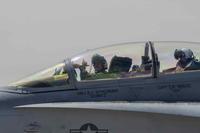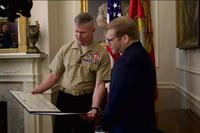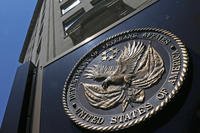
My former colleague at Marine Corps Times, Gordon Lubold, has a great story that ran a couple days ago in his new paper, the Christian Science Monitor.
He's taken a look at an initiative dreamed up on Capitol Hill to redistribute the nearly half-trillion (if you don't count wartime supplementals) DoD budget away from roughly equal shares and dole out more funds to the service that deserves them most.
Lubold writes:
A bipartisan House panel is nudging the Pentagon to begin a conversation on how to reform itself in many ways. But at the Pentagon, talk of change usually has a budgetary impact.
And, despite the past several years of "nation-building" and counterinsurgency operations in Iraq and Afghanistan, there has been virtually no change in the way the defense budget is carved up in at least 40 years, says Rep. Jim Cooper (D) of Tennessee, who chairs the panel.
"That right there is a statistical indictment of the process," Representative Cooper says. "There had to be a year in which there were greater needs in one area or another, and the system was unable to accommodate it."
The fiscal 2009 budget request released this month, for example, shows the Army requesting a 27 percent share, the Air Force asking for a 28 percent share, and the Navy, which includes the Marine Corps, wanting a 29 percent share of the proposed $515 billion budget.
Cooper's seven-member panel is expected to release a study this week on each of the branches' "roles and missions" that may threaten services that are seen to perform more conventional warfare. With the focus on the ground wars in Iraq and Afghanistan, that makes some in the Navy and Air Force worry.
There's a part of me that thinks this is a good idea...that it's kinda f-ed up for the Army to get a smaller share than the Air Force or Navy.
But, by the same token, I can understand the argument that Air Force planes and Navy ships are more expensive than most Army gear. And I'm not one of those ascetics that thinks the Air Force should only fly A-10s and F-16s and the Navy should trash its aircraft carriers for small patrol boats.
Lubold continues:
Cooper hopes the study will spark a broader debate about the need to reform national security, with new emphases on cybersecurity and nonmilitary government agencies. The panel isn't recommending specific changes to the budget as much as it is raising concerns about the Pentagon's historical aversion to change. More specifically, some services are clinging to a version of warfare the panel believes is dated.
"There should be vociferous support from inside the services, since the military has been left carrying the burden of the failures of our national security institutions," reads a draft of the report, to be released Thursday. "Instead, our military has resisted change just as they have past efforts at reform. The Air Force and Navy are reemphasizing more traditional threats and downplaying the unexpected
threats we face today."In fact, the Navy has tried to emphasize its so-called soft-power capabilities to combat terrorism, and senior Air Force officials seek to remind Congress that conventional threats, like those presented by China, still remain.
Congress is asking the same questions that many in and out of uniform have raised for some time. "After seven years of war, that we haven't budged one inch away from the cold war apportionment of the budget to me is Kafka-esque," said Robert Scales Jr., a retired Army major general, speaking last week at a think tank. "I just can't
explain it. I don't understand."The Pentagon has begun its own internal review of roles and missions. But with budgetary planners essentially in limbo until a new administration arrives next year, it's unclear how much impact such discussions will have, says Loren Thompson, a senior analyst at The Lexington Institute, a think tank outside Washington.
It may serve to create a debate in anticipation of the broader effort to review the nation's strategic planning document, the Quadrennial Defense Review (QDR). But when all is said and done, it's likely that things will remain largely the same, Mr. Thompson says.
Insofaras Cooper is trying to spark a debate on reapportionment of the DoD budget (one I'm sure the 4-percenters will want in on), it's a great move and long in coming. I'm a huge fan of Bob Scales and am tracking with him when it comes to budget frustration.
But don't count the Iron-Triangle out...they don't want any part of it.
But such talk of budgetary reform can sound like fighting words to some inside the Pentagon, as Adm. Mike Mullen, chairman of the Joint Chiefs of Staff, acknowledged earlier this month during hearings on Capitol Hill.
"What I worry about in this ... is that, not done well, it has a tendency to turn services against each other," Admiral Mullen said.
And moving money from one service to another can be politically insurmountable. Each service, with its own political constituency on Capitol Hill, carefully guards what belongs to it.
You got that right.
-- Christian








